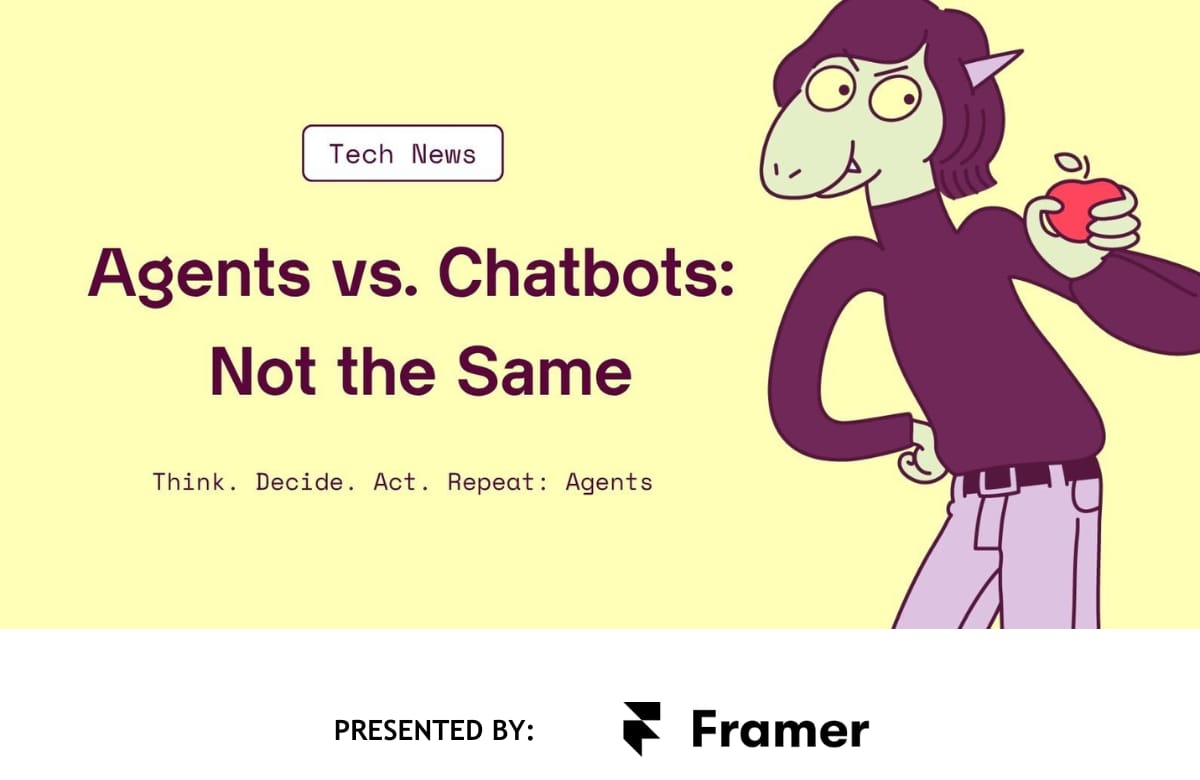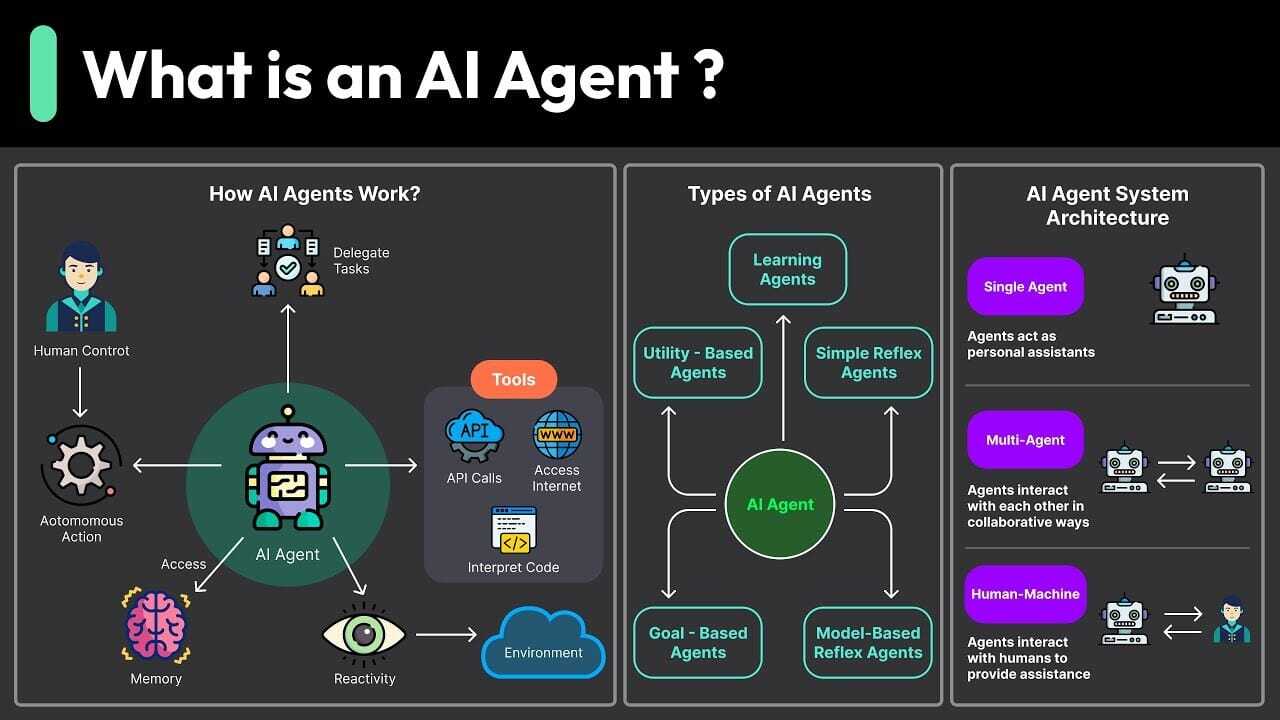- Roko's Basilisk
- Posts
- Agents vs. Chatbots: Not the Same
Agents vs. Chatbots: Not the Same
Plus: Likeness tech goes live, Xbox rebrands, and Truth Social walks a legal tightrope.
Here’s what’s on our plate today:
🧠 Everyone’s calling AI agents the next big thing. But what are they, really?
⚡ Xbox rebrands, YouTube detects fakes, Trump AI stirs controversy.
🧪 Fresh tools for smart workflows and faster builds.
🗳️ Should autonomous AI agents require human approval before acting?
Let’s dive in. No floaties needed…

Framer for startups.
Framer is giving early-stage startups a full year of the Pro Plan—completely free.
Why Framer?
Framer is the design-first web builder that helps startups launch fast. Join hundreds of YC founders already building on Framer.
Who's Eligible?
Pre-seed and seed-stage startups.
Offer available to new Framer users only.
What You Get:
✅ 1 year of Framer's Pro Plan ($360 value).
✅ Fast, professional site—no dev team needed.
✅ Scales with your startup.
*This is sponsored content

The Laboratory
What exactly is an AI agent?
Over the past three years, AI has dominated tech headlines, and for good reason. From reshaping the future of work to redefining creativity and ownership, artificial intelligence is everywhere. Tools like ChatGPT and Midjourney haven’t just changed how we work, they’ve introduced everyday users to a whole new vocabulary: LLMs, hallucinations, multimodal models, and machine learning.
Now, there’s a new buzzword in town: AI agents.
Industry leaders are all in. OpenAI’s Sam Altman, Microsoft’s Satya Nadella, and Salesforce’s Marc Benioff are calling AI agents the next big thing.
From chatbots to agents: What’s the difference?
While the excitement is building, there’s one issue that’s hard to ignore: no one can quite agree on what exactly qualifies as an AI agent.
What most do agree on is this: AI agents are designed to complete complex tasks with little or no human involvement. They’re meant to go far beyond traditional chatbots, evolving into autonomous systems that can plan, act, and learn on their own.
Unlike chatbots, which follow pre-written scripts or respond reactively, AI agents work in a perception-action loop; they observe, decide, and act based on what's happening around them. That’s what makes them so powerful.
And judging by the billions being poured into the space, major players believe AI agents could be the next ChatGPT moment for enterprise. But behind the scenes, there’s still a lot of confusion, and even among those building these tools, the definition is fuzzy.
The definition dilemma: No one agrees on what an agent is
Every major AI company has its own version of what an AI agent should be.
OpenAI, for example, describes agents as “automated systems that can independently accomplish tasks on behalf of users”. But elsewhere, including in their developer docs, they call them “LLMs equipped with instructions and tools”. To make things murkier, one of OpenAI’s product leads said on X that she sees assistants and agents as interchangeable.
Then there’s the question of how these agents differ from long-standing tools like Siri or Google Assistant. With new capabilities, these assistants are evolving into full-fledged agents, no longer just answering questions, but executing tasks across apps and systems.
Anthropic, another AI leader, has offered broader definitions, describing agents as everything from “fully autonomous systems that operate on their own for long periods”, to “prescriptive implementations that simply follow a set workflow”.
Microsoft takes a slightly different view. They say agents are the new apps, specialized tools with expertise in specific areas, while assistants are more general-purpose, like drafting an email or scheduling a meeting.
So, while the term AI agent is getting a lot of buzz, the actual meaning still varies widely.
Why big tech is betting on AI agents
Even if we set aside the hype, one thing is clear: the direction AI is heading in makes agents hard to ignore.
With ongoing innovation and aggressive enterprise targeting, it’s only a matter of time before most organizations adopt agents to streamline processes and boost productivity. Even with some uncertainties, the potential to reduce manual effort is driving rapid experimentation.
What sets agents apart is their ability to not just respond, but to take action. Thanks to the perception-action loop, they can invoke APIs, trigger web actions, and connect to tools, allowing them to complete real-world tasks.
For example, while ChatGPT can help you plan a vacation, it can’t actually book the flights. An agent, however, could. It can make a decision and act on it, without needing you to press every button.
Of course, this evolution won’t come without growing pains. Making agents efficient will require better GPU infrastructure, more energy, smarter algorithms, and a lot of domain-specific data to truly perform in enterprise settings.
Real-world use cases across industries
AI agents are already being put to work across a wide range of industries.
In agriculture, AI agents are being used to optimize planting schedules and resources. In finance, they handle autonomous risk audits and compliance checks or act as financial advisors. In content creation, AI agents handle tasks including writing articles, editing videos, assisting in research, and publishing.
However, their biggest use case and wide adoption is seen in customer support, where they are used to deliver highly personalized service. Additionally, AI agents are being used in disaster response, where they can analyze real-time data to support faster, smarter decision-making. In education, AI tutors adapt lessons to each student’s pace and learning style. In healthcare, supporting diagnostics, automating admin tasks, and monitoring patient vitals in real time.
And in marketing, AI agents are streamlining campaigns, managing inventories, qualifying leads, and much more. Their autonomy and adaptability make them a valuable asset across sectors.
Why autonomy is both a feature and a risk
Most AI tools today are reactive; they provide insights or predictions based on prompts. But agents are different. They can make decisions without being told what to do at every step, and that opens up a new set of challenges.
Especially in sensitive fields like finance or healthcare, unchecked autonomy could be risky. If an agent makes the wrong call, it might be hard to figure out why or to undo the damage. Since many models work like black boxes, auditing them can be difficult.
There's also the issue of bias. If agents are trained on flawed data, they might unintentionally reinforce harmful patterns. And because they often interact with APIs or external data sources, they’re vulnerable to adversarial attacks, data leaks, or manipulation.
Regulatory and infrastructure challenges
To tackle these challenges, developers are trying out new strategies. These include sandbox testing environments, stress-testing agents’ ethical limits, and even pairing working agents with governance agents that act like digital watchdogs.
But it’s not just about safety. There are practical challenges, too. Agents need power and lots of it. As AI usage grows, electricity demands will surge. Plus, we’ll need faster, more efficient chips and smarter storage systems to keep pace.
Human oversight is key to long-term success
No matter how smart agents get, humans still need to be in the loop.
Organizations should implement emergency shutdown protocols, regularly monitor for unexpected behavior (also known as model drift), and build scalable governance systems. Strong cybersecurity, ethical design, and real-time feedback loops will be crucial.
The road ahead: Opportunities and guardrails
AI agents are on track to change how we work, but only if we get the foundations right.
There are still big questions to answer: How do we give agents real-world context? How do we standardize how they communicate with humans and with other agents? And how do we keep their training data clean and unbiased?
The road ahead will require collaboration between developers, regulators, and organizations alike. But one thing’s for sure: AI agents are more than just a buzzword; they're the next frontier.


Quick Bits, No Fluff
AI Trump vs. free speech: A fake Trump video on Truth Social has reignited legal questions around AI likeness, political speech, and platform moderation.
Xbox, reimagined: Microsoft’s next Xbox isn’t a console, it’s a platform powering third-party hardware, blurring the line between console and ecosystem.
YouTube fights AI clones: YouTube’s long-awaited AI likeness detection tool is now live, flagging synthetic content that mimics creators without consent.

191,902 founders, investors, and leaders read this.
Founders and leaders who read Open Source CEO end up with 2.3x the cerebral horsepower of those who don’t.
Ok, we cannot actually prove that, but we think it’s about right. What we do know is that 190k+ readers from Google, TikTok, OpenAI, and Deel love our deep dive business content.
Subscribe to see what it’s all about.
*This is sponsored content

Thursday Poll
🗳️ What’s the biggest risk of giving AI agents autonomy? |

3 Things Worth Trying
AgentOps: Monitor, debug, and visualize your AI agents in real time with detailed behavioral logs and safety flags.
Flowise: A no-code platform to design and deploy custom AI agents visually, connecting LLMs to real-world APIs.
Superagent: Build production-ready, serverless AI agents that can handle autonomous workflows and complex tool use.
Meme of the Day

Rate This Edition
What did you think of today's email? |




